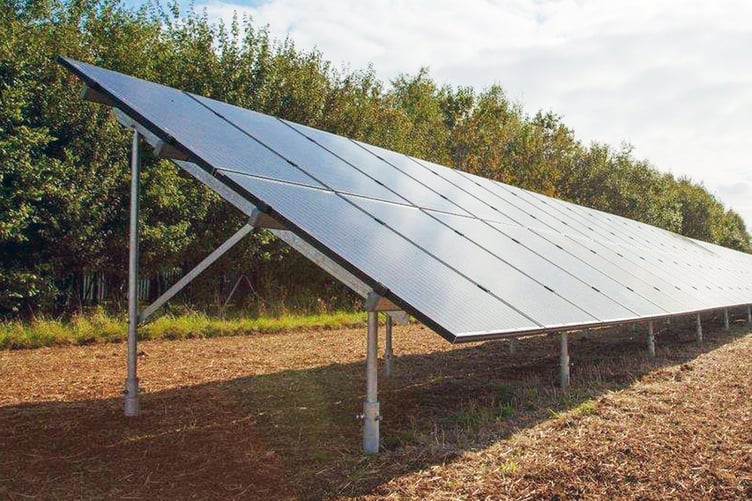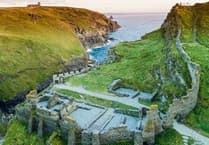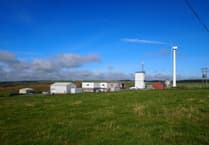Pyworthy is set to make history as the home of Britain’s first shared solar farm, however not everyone is happy about it.
Individuals near the strongly-contested Derril Water Solar Farm will be given two weeks exclusive access to buy shares from a ring-fenced portion of the project, meaning households in the local area will have the opportunity to power their homes with local green energy.
However Devon CPRE, the local branch of the countryside charity, says the offer doesn’t make up for the loss of farmland, while RES say they “specifically designed Derril Water to be dual-purpose, enabling solar and agriculture to co-exist”.
Renewable energy company RES has entered an agreement to sell its Derril Water Solar Farm to a Ripple-managed co-operative.
Ripple Energy will then turn Derril Water Solar Farm into Britain’s first shared solar farm. The project, developed by RES, will provide an alternative way solar farms can be owned in Britain.
Households across the country will be able to buy and own part of Ripple’s project.
Ripple is ring-fencing 10% of the ownership of Derril Water Solar Farm for those in the surrounding area and is urging interested local households and businesses to come forward. From April 18, individuals in the local area (postcodes EX21, EX22, EX23, PL15, PL16, PL32 and PL35) will be given two weeks exclusive access to buy shares from the ring fenced portion of the project.
The remaining 90% of the solar park will then be open to all households across Britain.
Derril Water Solar Farm will be Ripple’s third and most ambitious project to date and is an important milestone in its mission to make green energy ownership accessible to everyone.
Sarah Merrick, founder and CEO of Ripple Energy, said: “By offering consumer ownership, Derril Water Solar Park will become a completely different kind of solar park, one owned by the people it supplies low cost green power to. We want Derril Water to become a blueprint for consumer-owned solar parks around the world. We want to create a wave of green energy ownership that enables people to make a real climate impact, as well as stabilising their energy bills. People from all corners of Britain will be able to co-own Derril Water Solar Park, and we hope as many as possible will become part of this pioneering project.”
Lucy Whitford, RES’ managing director, UK&I, added: “Bringing Ripple on board at Derril Water offers a new way for consumers to share in the benefits of renewable energy and play a part in fighting climate change. The ability for local households and businesses to get involved connects the community directly with the project. Ripple’s model at Derril Water provides a direct way for consumers to lower their energy costs at such a critical time.”
However, having hotly contested the plans from the beginning, the local branch of Devon CPRE are sceptical.
Devon CPRE director Penny Mills said: “Devon CPRE has long campaigned for ‘Grass not Glass’ and supported the community of Pyworthy in fighting the Derril Water Solar Park, ultimately taking the legal challenge to the High Court.
“In our view, this announcement makes no difference to the reasons the Devon branch of the countryside charity backed residents in fighting Pyworthy’s Derril Water solar farm. The offer of shared ownership doesn’t alter the loss of precious farmland that could be used to produce food - at a time when there’s a greater than ever need to increase the UK’s food security, nor does it alter the loss of local democracy in a community which was overwhelmingly against this development.
“Ripple Energy is promoting its shared ownership scheme as a ‘benefit’ to the community by ‘ring-fencing 10% of the shares in Derril Water for local households and businesses to buy’. To our mind, genuine community initiatives are shaped by local communities, not imposed on them.
“Ripple and RES say they will work closely with the local community on this project, but this is the first our charity and, we believe, the people in Pyworthy have heard of this scheme - when the two companies involved decide to jointly announce it to the general public. So much for community involvement!
“Barely a week goes by without one local authority or another in Devon considering a solar farm proposal. Next week a site visit is due to take place on land in East Devon where Aura Power plans to cover 145 acres of farmland at Whimple with solar panels. Devon CPRE has objected to the scheme, which is recommended for approval despite many concerns from the local community. Among numerous objections submitted to East Devon District Council, Devon CPRE states that 94.6% of the proposed site is graded 3a or 3b land, thereby including Best and Most Versatile (BMV) land, which should be protected for food production.”
She added: “Solar power has a part to play in providing so-called renewable energy but, in a wet climate like Devon’s, covering thousands of acres of productive pasture with glass is not the ‘green’ solution it’s claimed to be - especially when there are plenty of redundant brownfield sites and rooftops where the panels could be put, for example, supermarkets, car parks and council offices.
“At a time of rapidly rising food prices, Devon’s farmland should not be covered in solar panels to produce small quantities of expensive electricity at times of the day when it is least needed but should instead be used to produce high-quality food for local consumers.
“We question why RES decided to involve a third party in its plans for Derril Water Solar Park? A sceptic might say it’s because they have so far failed to win over the majority of local residents to their scheme.”
What do you think? Write to us at [email protected]





Comments
This article has no comments yet. Be the first to leave a comment.